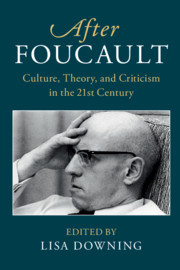Book contents
10 - Foucault's Ethics
from Part III - Reading After Foucault
Published online by Cambridge University Press: 30 May 2018
Summary
In his auto-fiction To The Friend Who Did Not Save My Life, originally published in French in 1990, Hervé Guibert paints a thinly disguised portrait of Michel Foucault in the character of Muzil, who lies dying of AIDS-related complications in a hospital. ‘[L]ike a spy, like an adversary’, the narrator jots down all the things ‘around the periphery of [Muzil's] life’ that contrast with the ‘well-polished bare bones enclosing the black diamond … that seemed destined for his biography’. The question of how to speak or not speak about the life of another weighs upon the narrator who, on returning home from the hospital, breaks down:
What right did I have to record all that? What right did I have to use friendship in such a mean fashion? And with someone I adored with all my heart? And then I sensed – it's extraordinary – a kind of vision, or vertigo, that gave me complete authority, putting me in charge of these ignoble transcripts and legitimizing them by revealing to me (so it was what's called a premonition, a powerful presentiment) that I was completely entitled to do this since it wasn't so much my friend's last agony I was describing as it was my own, which was waiting for me and would be just like his, for it was now clear that besides being bound by friendship, we would share the same fate in death.
The narrator's ‘vision, or vertigo’ of mastery is shamelessly intrusive, but it also unleashes a counterforce that blurs the differences between the two men's lives. Knowing that he will only minimally survive Muzil, the narrator considers what it means to disown one's self just as one is transformed by and projected into the mortality of the other. He confronts an ethical dimension that isn't mobilized in the name of rights, of life, or the saving of a life; rather, he encounters something else entirely, a care for the self that rejects narcissistic claims about defending the future well-being of one's own ‘life’.
In his book The Body of This Death, William Haver gives a radically counterintuitive interpretation of Foucault's concept of ethics. Instead of aligning it with a moral subject's conduct and self-transformation, Haver reads ethics as a ‘question’ that exposes the self to the impossible limits of its life and its humanity:
- Type
- Chapter
- Information
- After FoucaultCulture, Theory, and Criticism in the 21st Century, pp. 155 - 169Publisher: Cambridge University PressPrint publication year: 2018
- 1
- Cited by

